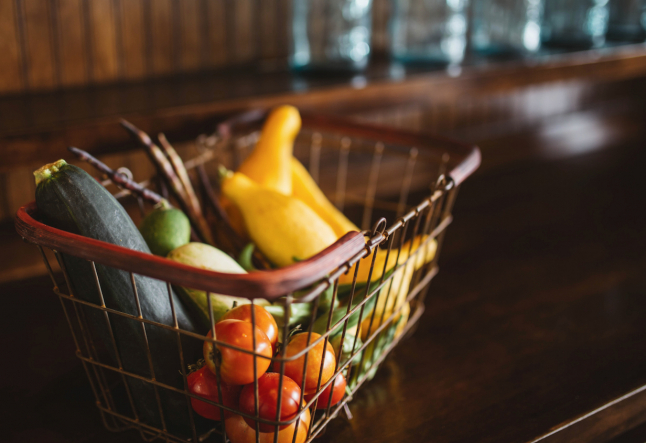whole foods

the edge against cancer
Cancer. It seems like every other day new research ties cancer to what you eat, drink or breathe, or where and how you live. This year, new cancer cases are estimated to reach close to 1.4 million. While there may not be a magic bullet to eradicate this disease, there are choices you can make that will give you the edge against the “Dreaded C.”
For example, choosing foods containing nutrients with proven cancer-fighting abilities can help reduce the odds of the disease affecting your system. Fortunately, these nutrients are in plentiful supply in the produce section of your supermarket. Make them part of your daily anti-cancer diet.
Folate
Folate is one of the key nutrients that can reduce the incidence and onset of colorectal cancer, as proven by the 1988 Nurses’ Health Study involving 88,756 female nurses. Among other results, the study directly linked the high level of folate in their diet (greater than 400 mcg/day) to a 74% reduction in their risk for colon cancer – even after adjustments were made for alcohol intake, age, physical activity, red meat consumption, fiber intake, smoking history, family history and aspirin use.
But it’s not just women who benefit from folate. The National Health and Nutrition Examination Survey (NHANES) Follow-up Study (NHEFS) showed that the relative risk of colon cancer for male and female study participants was 60% less in those whose diet contained more than 239 mcg of folate, compared to those whose daily levels were less than 103.3 mcg of folate.
Folate can be found in liver (770 mcg per 3.5 oz), cooked lentils (180 mcg per ½ cup), Brussels sprouts (47 mcg per ½ cup) and broccoli (39 mcg per ½ cup).
Glucosinolate Compounds
According to a report by the National Cancer Institute, at least 80% of all cancers are linked to environmental causes, such as exposure to agents in the air and water as well as lifestyle factors such as smoking and diet.
Fortunately, there is a nutrient readily available in food that is a key ingredient in the production of Phase II liver detoxification enzymes. These enzymes attack environmental carcinogens (cancer-causing chemicals) with a one-two punch – by destroying the reactive centers of the compounds and by detoxifying them through the liver, which reduces both the odds of cancer taking hold and the severity should your system be under attack.
Glucosinolates can be found in cruciferous vegetables such as broccoli, collard, kale, cabbage mustard and Chinese kale, with research statistics indicating that broccoli (39 mcg of folate per ½ cup) and kale were significantly associated with a lower prevalence of colorectal carcinomas.
Glutamine
Keeping things moving smoothly in the (ahem) lower levels is essential, since one of the intestinal tract’s key tasks is to eliminate environmental toxins from the body. And to keep the intestinal tract healthy, the system needs sufficient amounts of glutamine, an amino acid that supports the detoxification system and maintains optimal intestinal health.
However, the production and level of glutamine can be adversely affected by impaired detoxification mechanisms, cancer, burns, trauma, chronic protein catabolism and excessive exercise, as well as surgery. This makes glutamine deficiency far too common, which in turn leaves the intestine vulnerable to microbial translocation (passage of bacteria or toxins into the bloodstream via the intestinal wall).
The solution is to fill up your menu with cabbage and beets – both of which contain high levels of glutamine, along with other beneficial agents.
Nutrient-Support During Traditional Cancer Treatment
While the role of the above nutrients is to help ward off cancer, the following powerhouse nutraceuticals can provide additional support to the overall system while counteracting the negative effects of medical treatments needed to treat cancer. These nutraceuticals can enhance the effects of traditional cancer treatment and actively destroy cancer after it appears. They have also been shown to decrease the side effects of traditional cancer treatments while protecting normal cells from the indiscriminate damage done by these treatments. Finally, nutraceuticals can prevent or delay the onset of cancer.
The following five nutraceuticals all provide key benefits for those patients undergoing traditional cancer treatment, and can safely be used to prevent the onset of cancer. They can also be used alone or in combination with standard chemotherapy to treat it.
• Maitake Mushrooms have been shown to inhibit tumor growth in advanced breast, lung and liver cancers . Recommended product: Maitake D-fraction manufactured by Maitake Products, Inc.
• Proteolytic Enzymes are a group of four enzymes (trypsin and chymotrypsin from animal sources, papain from papaya sap, and bromelain from pineapple stems) that have been shown to reduce the side effects of chemotherapy and radiation therapy. Recommended product: National Enzyme Company ® or Wobenzyme ®.
• Curcumin, found in turmeric, is an antioxidant and anti-inflammatory agent that affects the creation, growth and spread of tumor cell lines throughout the body. Recommended product: CurcuMax™ by Integrative Therapeutics.
• Quercitin is a flavonoid antioxidant that affects the chemotherapeutic agents inside cancer cells and the regulation of the cell cycles, along with overcoming mutations that result in drug resistance in tumors.
• Graviola is found in the leaves, bark and stems of evergreen native to tropical areas in South and North America. It targets cancer cells, inhibiting the growth of cancerous cells including those that are drug-resistant. Recommended product: Graviola by Amazon Herb Company.
Making these high-power but system-friendly whole foods and nutraceuticals part of your diet can arm you with the defenses you need to ward off cancer.
Read next >> you are where you eat